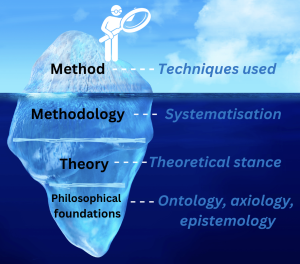
As we have discussed in previous chapters, social science research is concerned with discovering things about the social world: for instance, how people act in different situations, why people act the way they do, how their actions relate to broader social structures, and how societies function at both the micro and macro levels. However, without theory, the ‘social facts’ that we discover cannot be woven together into broader understandings about the world around us.
Theory is the ‘glue’ that holds social facts together. Theory helps us to conceptualise and explain why things are the way they are, rather than only focusing on how things are. In this sense, different theoretical perspectives, such as those discussed in this Chapter, act as different lenses through which we can see and interpret the world around us.

Theory testing and generation is also an important part of social scientific research. As shown in the image below, different theories are rooted in different philosophical foundations. That is, various theories arise in accordance with different ways of seeing and living in the world, as well as different understandings about how knowledge is understood and constructed. As we learned earlier in the book, these concern both ontological and epistemological considerations, but also axiological considerations; that is, questions about the nature of value, and what things in the world hold value (including in relation to one another). While theory is rooted in these philosophical foundations, however, it also gives way to different ways of doing research, both in terms of the methodology and methods employed. Overall, using different theoretical perspectives to consider social questions is a bit like putting on different pairs of glasses to see the world afresh.
Below we consider some foundational social science theories. While these are certainly not the only theoretical perspectives that exist, they are often considered to be amongst the most influential. They also provide helpful building blocks for understanding other theoretical perspectives, as well as how theory can be applied to guide and build social scientific knowledge.

Structural functionalism is a theory about social institutions, ‘social norms’ (i.e., the often unspoken rules that govern social behaviours), and social stability. We talk more about social institutions in the next Chapter of this book, but essentially they are the ‘big building blocks’ of society that act as both repositories and creators/instigators of social norms. These include things like school/education, the state (often called a meta-institution), the family, the economy, and more. In this regard, structural functionalism is considered a macro theory; that is, it considers macro (large) structures in society, and concerns how they work in an interdependent way to produce what structural functionalists believe to be ‘harmonious’ and stable societies. Structural functionalists are particularly concerned with social institutions’ manifest and latent functions, as well as their functions and dysfunctions (Merton [1910-2003]).
Manifest functions of social institutions include things that are overt and obvious. By contrast, latent functions of social institutions are those that are more hidden or secondary. For instance, a manifest function of the social institution of school is to teach students new knowledge and skills, which can assist them to move into chosen careers. Alternatively, we might also argue that school has other latent functions, such as socialisation and conformity to social norms, and building relationships with peers.
In addition to manifest and latent functions, structural functionalists are also concerned with the functions and dysfunctions of social institutions. They believe, for instance, that dysfunctions play just as much of an important role as functions, because they enable social institutions to identify and punish them, thereby making an example of dysfunctional elements (e.g., punishing those committing crime). This serves to reinforce social norms around how society should function.
Take a piece of paper and, in your own words, write down a brief definition of structural functionalism. Then re-read the above sub-section. How does your understanding fit with the information above?